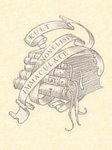Writing daily has its perks. There's a feeling of continuity, and a flow that comes with daily writing that turns the creative process into a kind of perpetual motion machine. The writing goes faster when it's daily too, and the habit of daily writing shortens or eliminates a lot of the chronic "now I'm sitting down to write" problems.
Writer's block: I haven't had as much trouble with writer's block as I used to back in the day, whenever the day was--it's been a long time. Sometimes I get dragged down by a scene, or I get bored, or a storyline fizzles. When that's happened a few gizillion times it's no longer a big deal. You go back and figure out where the story became predictable, or where you lost the thread, or where the action stopped and you fix it, or you let that project rest for a while and work on another one.
Staring at the blank screen: A blank screen isn't as intimidating as it used to be. A few seconds, sometimes minutes if I'm having to dig deep, and away we go. I'll probably change the beginning after the first draft anyway. A blank screen is an opportunity to finger paint before you get down to the actual process of creating art.
What-to-do-itis: Related to writer's block. Sometimes when the story runs out of steam, people get stressed. They start taking polls from their readers (if they're serializing it or workshopping it) asking what to do next. They fret that the story is horrible anyway and not worth pursuing. They try to work out logically what would be the next plot step, or hope that their characters will bail them out. When you've done enough daily writing, you learn what works for you, and it's probably none of the above strategies which involve popular opinion or muses or characters with their own will. Me? I do the worst possible thing to the character. Sometimes it's the thing they dread the most. Sometimes it's worse than the thing they dread the most, beyond their imagination. Doing the worst thing takes guts and thinking, and sometimes a little plot reworking. Yeah, I sweat, but you know, there's this magical thing called reverting to the original document if it doesn't work out. The point being, when the story stops working, it's time for the writer to get to work and stir things up a bit.
No time to write: Uh huh. The thinking is, if I don't have three hours, or an hour or whatever time frame, it's not worth sitting down to write. I have to have X amount of time to 'get in the mood' or 'find the flow,' etc. EH! Daily writing shortens this artificial time frame until eventually you sit down at the computer to check email, glance at the clock, and think hey, I've got five minutes before I have to start getting ready for work. And then you push that five minutes to fifteen and grab a Slimfast instead of making a bologna sandwich. Works for me.
These constant interruptions!: The situation is that when you sit down to write, there are distractions. Currently I'm tired, the cat is meowing for attention, I have dishes to do, I have a fresh sunburn that makes my shoulders do the heat emanation thing and makes my shirt feel scratchy. Some days you have to get up to deal with something every thirty seconds, or you contend with loud and obnoxious music or a couple fighting next door, dogs barking, or people come in and want to ask you this or want you to find them that, and you want to nail the door shut (if you have a door) to the office and hang up a "Do Not Disturb" sign next to a biohazard placard in the hopes that you'll have two frickin' minutes to rub together. With enough daily writing, two consecutive minutes aren't necessary, although they're very much appreciated. Fifteen seconds is enough to complete a sentence and/or thought between putting out fires and stoppage of arterial bleeding. (Looks like the kitty has food, and the dishes really can wait until morning. We're good to go for some writing, with or without further interruptions.)
Can't ... find ... right ... word: I used to use the thesaurus a lot. I also used to stop writing entirely until I found a fact I needed. I kept 3x5 cards (hard to imagine that I used to be organized) of various world building and character facts so that I could, at a glance, learn what the capitol city of Arrak el Eslahm was, count to fourteen using base 12 number systems and know exactly how long it takes to travel from Earth to Alpha Centauri traveling at 1.4 light speed. I kept careful timelines and took travel distances into account even on a first draft. If I had to look something up in the library, all writing would stop until I could convince my mom to take me or until I had enough cash to hop a bus there and back again. Ironic that I learned to just type XXXXXX or parenthetical comments like (and here Kami inserts a brilliant passage about Beggar Smith cleaning her black powder firearm with all kinds of juicy details supplied by Jacob) before Google and Wikipedia. Then again, relying too much on those 'fast' sources still slows down the writing process more than is strictly necessary. If researching facts, going back through your work to find the color of a character's horse or paging through a thesaurus inspires, fine. If it's an excuse to stop writing, boo! XXXXX rules!
I'm sure I learned more from daily writing, but I forgot. Oh well! Time to write some more!







